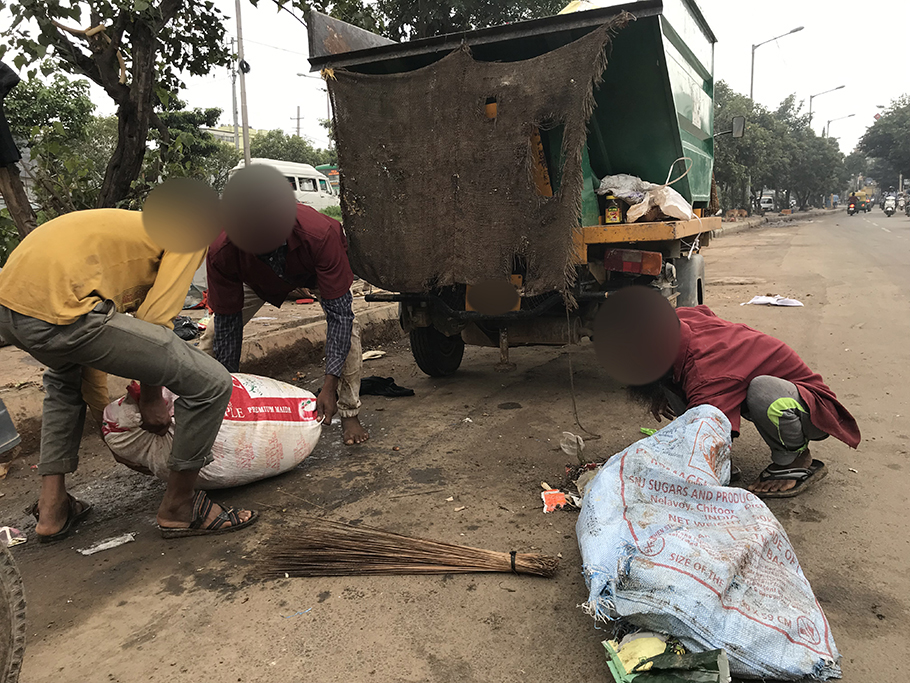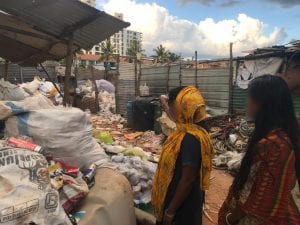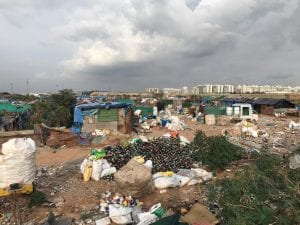
B'luru migrant Bengali labourers convert garbage to 'gold', get paid nothing
The Bengali Muslim man from who led The Federal to this story couldn’t have picked a more dangerous time to speak out.

The Bengali Muslim man who led The Federal to this story couldn’t have picked a more dangerous time to speak out.
But, if what he showed us over a three-day tour of the city’s Bengali Muslim slums is any indication, this could be the next big scam involving garbage contractors hired by the city’s civic agency, the Bruhat Bengaluru Mahanagara Palike (BBMP).
“I haven’t been paid in 10 years,” said the man, who hails from Nadia district of West Bengal, on the Indo-Bangladesh border. “I am so angry now that I feel no fear.”
He pulled out a thick file of attendance musters and held it up. “Take a photo. It’s a list of 48 Bengali Muslim mini-truck owners from this slum who, like me, haven’t been paid by the contractor between 2007 and 2018. There are hundreds more, maybe even thousands who haven’t been getting any payment for cleaning the city’s garbage,” he said.
He added that the contractor had been receiving payments from the BBMP throughout this period towards the maintenance of the trucks and salaries for the workers and drivers. “At least ₹50,000 per truck, per month. More money for larger trucks.”
As he posed with the documents, his wife pleaded, “Please don’t put his name or photo in your report. They will kill him or fix him in a police case.”

She said that a shopkeeper in their neighbourhood hailing from Malda had recently been arrested in a false drug peddling case after he complained to some activists about the police collecting protection money from Bengali Muslims, all of whom incidentally are Indian citizens.
Fear of being branded Bangladeshi
Fears are rife among Bengali Muslims here that an Assam like situation will soon play out in Karnataka where the Bharatiya Janata Party (BJP) government is on the verge of opening a detention centre for illegal immigrants.
Plans have also been announced to introduce a citizen’s register in the state to identify undocumented foreigners, including Bangladeshis.
Also read: NRC: Fear and dismay at ‘India-Bangladesh border’ in Bengaluru
This is in line with the larger vision laid out by union Home Minister Amit Shah who has repeatedly asserted that illegal migrants will be identified and deported.
“Plainclothes policemen and intelligence officers are already on the prowl in the shanty towns on the outskirts of the city where Bengali Muslims live by the thousands. They can arbitrarily book anybody as an illegal foreigner,” said R Kaleemullah, an independent activist who has been arranging legal defense for Indian Bengali Muslims wrongly booked as Bangladeshis.
“When a person is booked under the Foreigners Act as an illegal immigrant, the burden of proof is on them to prove their citizenship. They can be detained till they prove they are Indians,” said lawyer Darshana Mitra, a founding member of Parichay, a collective that provides legal aid to people excluded from the NRC in Assam.
Kaleemullah told The Federal that Bengali Muslims in the city are working not just in the garbage industry but also in hotels, in construction, as domestic help, home delivery. “They are rarely paid properly. If they raise their voice, employers threaten to tell the police that they are from Bangladesh. The police attitude is that every Bengali Muslim is a potential Bangladeshi.”
Our source finally listened to his wife when she shrieked, “The police, BBMP officers, the contractors, the politicians… they are all in it together. Who will you complain to? Because of your madness, they will throw all of us in jail saying we are Bangladeshis.”
He said pensively, “The man who owes us money has no fear while we are hiding like rats. She’s right, please don’t use my name and blackout my face from the photo.”
The scam
The source first took us around his own neighbourhood near the international tech park to find the people on his list of 48, all owners of mini-trucks, who haven’t been paid for a decade. He tracked down 13; the others had either shifted from the locality or were away at work.
On the condition of anonymity, they sat down to explain how things work. “We (Bengali Muslims) do the worst job in the garbage business. Not the sweepers who clean the streets every morning,” a man from Murshidabad said.
There are over 18,000 sweepers, also called Pourakarmikas, registered with the BBMP. An overwhelming majority of them are Telugu, Tamil and Kannada speaking Dalits belonging to caste groups that have been historically forced into manual scavenging.
The Dalit Pourakarmika’s continue to face caste-based discrimination and are exploited and underpaid by contractors. Yet, the Bengali Muslims, running the garbage trucks are arguably the most vulnerable and exploited people in the garbage business.
“Our work starts where the sweepers’ job ends. They use brooms, shovels and push carts to heap the garbage in one spot. We are the people who get into the heaps, load the rubbish into the trucks with our bare hands and take it to the landfills and recycling plants,” said the Murshidabad man.
ALSO READ: NRC: Once bitten, twice shy – Hindu immigrants in West Bengal
The truck owners said that wages are not the only monies due to them from the contractor. “They didn’t pay for fuel or maintenance of the vehicle. We also had to pay the men who helped us haul the garbage into the truck and unload it,” one of them said. These helpers always travel in the back of the truck and sit on top of the garbage.
How did the truck owners survive without wages for 10 years and still manage to meet the fuel, maintenance and labour expenses? “By segregating the garbage and selling the recyclable stuff,” said a man from Krishnanagar, West Bengal.
He revealed an aspect of the deal which our first source from Nadia hadn’t told us about. “From the first day, the contractors made it clear that we wouldn’t be paid any anything. The deal was always that we would be allowed to segregate and sell the dry waste,” he said.
Everybody, except the source from Nadia, nodded in agreement. He said to them angrily, “Don’t you know that the contractor has collected money in our name from the BBMP? That is our money, the deal is illegal.”
 He quickly made some calculations. “The BBMP pays ₹50,000 per truck, per month to the contractor. I had three trucks. At ₹6 lakh a year, per truck, he has collected at least ₹1.8 crore in my name from the BBMP in these 10 years,” he said and asked the others to calculate how much money they have lost.
He quickly made some calculations. “The BBMP pays ₹50,000 per truck, per month to the contractor. I had three trucks. At ₹6 lakh a year, per truck, he has collected at least ₹1.8 crore in my name from the BBMP in these 10 years,” he said and asked the others to calculate how much money they have lost.
They did not share his outrage and told this reporter that they were happy with whatever they had earned. They felt prospects were still worse back in the villages where they come from.
Interestingly, all of them had stopped working for BBMP contractors and were working directly for private waste segregation and recycling companies that have cropped up over the last few years.
On the way to the next Bengali Muslim settlement, the source said, “Imagine how much money the contractor has made from the 48 people in my list. But none of them want to fight, they are too scared.”
A year ago, he managed to get six men to join him in filing a complaint against the contractor through a trade unionist lawyer. “They have all since stopped contact with me and want nothing to do with the case.”
He claimed that the same musters of the 48 men are still being used by the contractor to get paid by the BBMP. This could not be independently verified by The Federal.
In the next ghetto, our source introduced us to a truck owner hailing from Kandi in Murshidabad who tried a different tactic with his contractor. “I had four large trucks and eight helpers. We all struck work two years ago and demanded that the contractor share the money he was collecting in our name from the BBMP,” he said.
The contractor instantly sacked the crew and hired a new one. “When we tried to start working independently in the recycling business, the contractor got the police to seize all my trucks on the charge that I was illegally dumping garbage on the roadside,” he said. He now works in somebody else’s truck as a helper.
The All India Central Council of Trade Unions (AICCTU), which is affiliated to the CPI(ML), has the largest union of pourakarmikas in the city. Clifton D’ Rozario secretary of the CPI(ML) told The Federal that they haven’t been able to organise the Bengali Muslims who do not technically fall into the pourakarmika category but are very much part of the garbage management system.
ALSO READ: NRC: The pain and struggle that never ends
“We have managed to get many statutory benefits for the city’s pourkarmikas. The contract labour system has now been abolished by the High Court and pourakarmikas are getting direct wage transfers into their bank accounts. But the Bengali Muslims are completely in the grip of their contractors and will never speak against them,” he said.
The source took us from one ghetto to another in different parts of the city’s eastern fringe which form the Mahadevpura and Bommanahalli zones of the BBMP. It’s a very surreal part of the city: 25-30 storey apartment complexes, villas, posh farmhouses, tennis courts and football arenas, large IT industrial complexes, coconut groves, grape orchards, eucalyptus plantations and landfills connected by godawful roads in the middle of large open fields.
The Bengali Muslim shanties are on rented plots in the open fields. The landlords are waiting for clearance from civic authorities to build more residential and commercial complexes in this fast-developing part of the city.
Our source introduced us to dozens of truck drivers hailing from districts on the Indian side of the Indo-Bangladesh border. All of them said they hadn’t been paid for years. All had stopped working with BBMP contractors and were doing commercial work.
Another interesting fact emerged: all the contractors were from the politically powerful Reddy and Gowda communities. The open fields rented out for the shanties also belong to landlords from the same two communities.
An endless supply of slave labour?
If all the truck drivers have stopped working for the BBMP, how were the contractors managing? “Come to the ring-road intersection at 8 am tomorrow and I’ll show you,” the source said.
He took us to a part of ring road that was lined with brand new, green-yellow, three-wheel tippers. They were waiting to unload garbage into large trucks. “These brightly painted tippers have replaced our dirty trucks. They have been purchased by the contractors and leased to the BBMP,” he said, “They bought them with our money.”
Solid waste management expert and citizen activist, N S Ramakanth told The Federal that the tippers have been introduced as part of the BBMP’s 2017 “micro-plan”. “There are now about 5,000 such three-wheel tippers in the city. They have completely replaced the mini-trucks,’ he said.
Each tipper has a driver and a cleaner sitting behind on the pile of garbage. It takes both to haul the garbage and they mostly go at it with their bare hands.
“Most of the drivers and cleaners you see here are from Bangladesh. They will never open their mouth and take whatever they are given. They are slaves of their Bangladeshi thekedar (labour contractor),” he said and explained another, even murkier side to the business.
The Bangladeshi labourers are not actually employed by the contractors but by the labour agent who traffics them across the border by bribing sentries from both countries. The negotiations happen between the labour contractor and the BBMP contractor. The workers take what they are given.
One of the drivers recognised our source and agreed to speak. “I am paid Rs. 11,000 for a month’s work without a weekly break. That’s my salary, diesel and maintenance,” he said. The cleaner with him is paid ₹5,000 a month. Both were from the Faridpur district of Bangladesh.
When we checked with Ramakanth about the rates offered by the BBMP, he said, “The contractors are paid ₹51,000 per tipper, per month. A driver is supposed to get ₹18,000 and the cleaner is supposed to get ₹13,000 per month. This is after PF and ESI deductions. It covers fuel and maintenance.”
 Asked how he manages to pay for fuel and maintenance, the tipper driver said, “By doing kali khatta (Bengali for scrap trading).”
Asked how he manages to pay for fuel and maintenance, the tipper driver said, “By doing kali khatta (Bengali for scrap trading).”
Our last stop was a dumping yard about an hour outside the BBMP’s eastern limits. We stood a safe distance from where mini-trucks were unloading garbage as the source was afraid of being spotted by the contractor.
He said, “This is where the 48 men on my list used to bring the garbage. All these trucks you see, all are owned by Bangladeshis. The contractor has conveniently replaced us with them.”
He said that the numbers of Indians in the garbage business of the city has been steadily declining since 2013-14. “Today, for every one of us in the garbage business, there are 10 Bangladeshis,” he said, “Kaan, chokh, mukh bondo (They live like they cant see, hear or talk).”
It was risky to approach the truck crews at the site, so we waited on the highway leading to place. Only one driver stopped to speak us.
“Taka? Kono taka-poisa nai (Money? We get none),” the driver said when asked how much he was being paid by the BBMP contractor. He said he was making a living by selling recyclable scrap sorted from the garbage.
The driver (46) and the cleaner (20), uncle and nephew, were frank about where they were from. “Khulna Jela (Khulna district), Shonadanga Thana (Shonadanga police limits), Bangladesh,” they said in chorus, “Churi korini, babu (We haven’t stolen anything, sir).”



